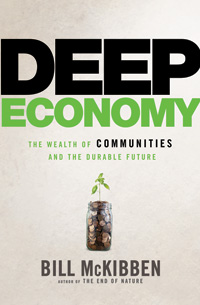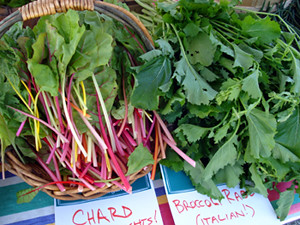 Today I got to see a great idea in action. Project FRESH is a nutrition program that does far more than promote nutrition. To be honest, from my perspective as a gardener and a person interested in community building, I think that nutrition just happens to be a side benefit of Project FRESH.
Today I got to see a great idea in action. Project FRESH is a nutrition program that does far more than promote nutrition. To be honest, from my perspective as a gardener and a person interested in community building, I think that nutrition just happens to be a side benefit of Project FRESH.
Here's how it works. In the late 1980's, a number of states (including Michigan) decided that it might be a good idea to create a way for low-income folks benefiting from US Department of Agriculture programs like WIC to have access the fresh vegetables and fruits found in farmers' markets.
Today, Project FRESH is a mainstay of the Women, Infants and Children (WIC) nutrition program in many states. The project provides coupons to WIC participants that they can spend at local farmers' markets. Well received by new mothers, the program has been expanded to serve seniors through Senior Project FRESH. At the end of the day, the farmers trade in the coupons for cash.
Sure, this is a creative way to encourage poor people to eat fresh produce, which is a noble idea but an ethic I'm not all that sure I support over giving poor people the same choices as those with cash.
The better part of this program is the way in which these public dollars are multiplied eight times as they:
- Feed the poor,
- Introduce people to new, local foods,
- Financially support small, local farmers,
- Help build local food systems instead of trucking under-ripe veggies across the continent,
- Introduce consumers to farmers (people who are often not only from different geographical communities, but also typically of different races and ethnicities),
- Build community by promoting commercial amenities like markets,
- Build more community by creating places where people gather and meet their neighbors,
- And bring people back into touch with real food and how it is really grown.
Here in Michigan, Project FRESH is administered by the
Michigan Department of Community Health in cooperation with the U.S. Department of Agriculture and
Michigan State University Cooperative Extension. Local health agencies and
MSU extension offices statewide deliver Project FRESH services in cooperation with the organizers of local farmers' markets.
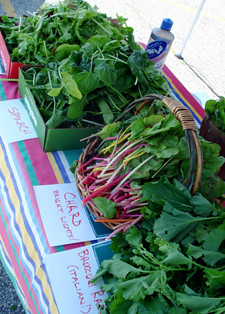
Earlier this year, I had the opportunity to sell some of my Perkins Garden surplus at the new and emerging Southeast Community Farmers' Market, which recently moved to the corner of Franklin and Fuller in partnership with Divine Grace Ministries and the
Greater Grand Rapids Food Systems Council. That Thursday I sold spring greens, early chard and broccoli
raab that was sure to bolt while I was away on vacation the next week. While my produce and the market customers were not the best match, I did earn a dozen or so bucks which were tossed into the Food System's community garden fund.
Today I returned with a surplus of about 20 golden zucchinis, 30 cucumbers, four heads of lettuce, a handful of white baby eggplants, and three pints of purple beans. The veggies and the shoppers were a much better match and I only came home with a half dozen cucumbers and the eggplants. I netted more than twenty bucks from produce that otherwise probably would have eventually been sent to the compost pile, The cash itself was composted if you will, returned to the community garden program to make the program more fertile.
But the best part of it was that half of the dollars earned were federal tax dollars that fed the poor, built community, supported local community gardens, strengthened the local food system, and kept one more box full of veggies back in California where they were grown and belong.
In this day of scarce resources, it's good to see federal dollars supporting conservation by building local food systems instead of propping up the old industrial model that relies upon cheap oil from the middle east to ship veggies that can be grown anywhere everywhere.
I count it as a good day when I can see and experience a creative idea like Project FRESH that has the support of both the government
and local people. It's an especially good day when the program works as well as this one does.
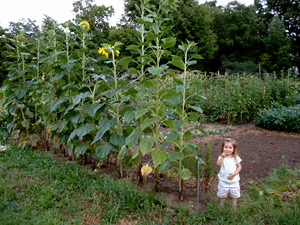 Yesterday I received probably one of the best birthday gifts a dad could receive--a fun and peaceful evening out with my daughter. With a busy week planned, I needed to get out to the People's Republic of Perkins to pick zucchini and tend to a few other tasks.
Yesterday I received probably one of the best birthday gifts a dad could receive--a fun and peaceful evening out with my daughter. With a busy week planned, I needed to get out to the People's Republic of Perkins to pick zucchini and tend to a few other tasks.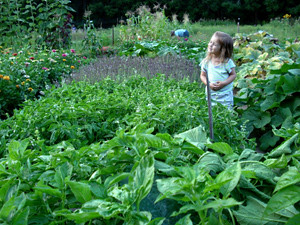 Abbey was so into gardening that we got a lot of other chores done too. We weeded, thinned and transplanted some small collards, picked zucchini, cucumbers and broccoli, deadheaded the marigolds, and sprayed the pumpkins and squash with egg water to repel the woodchucks that have been burrowing under the fence and into the garden.
Abbey was so into gardening that we got a lot of other chores done too. We weeded, thinned and transplanted some small collards, picked zucchini, cucumbers and broccoli, deadheaded the marigolds, and sprayed the pumpkins and squash with egg water to repel the woodchucks that have been burrowing under the fence and into the garden.









